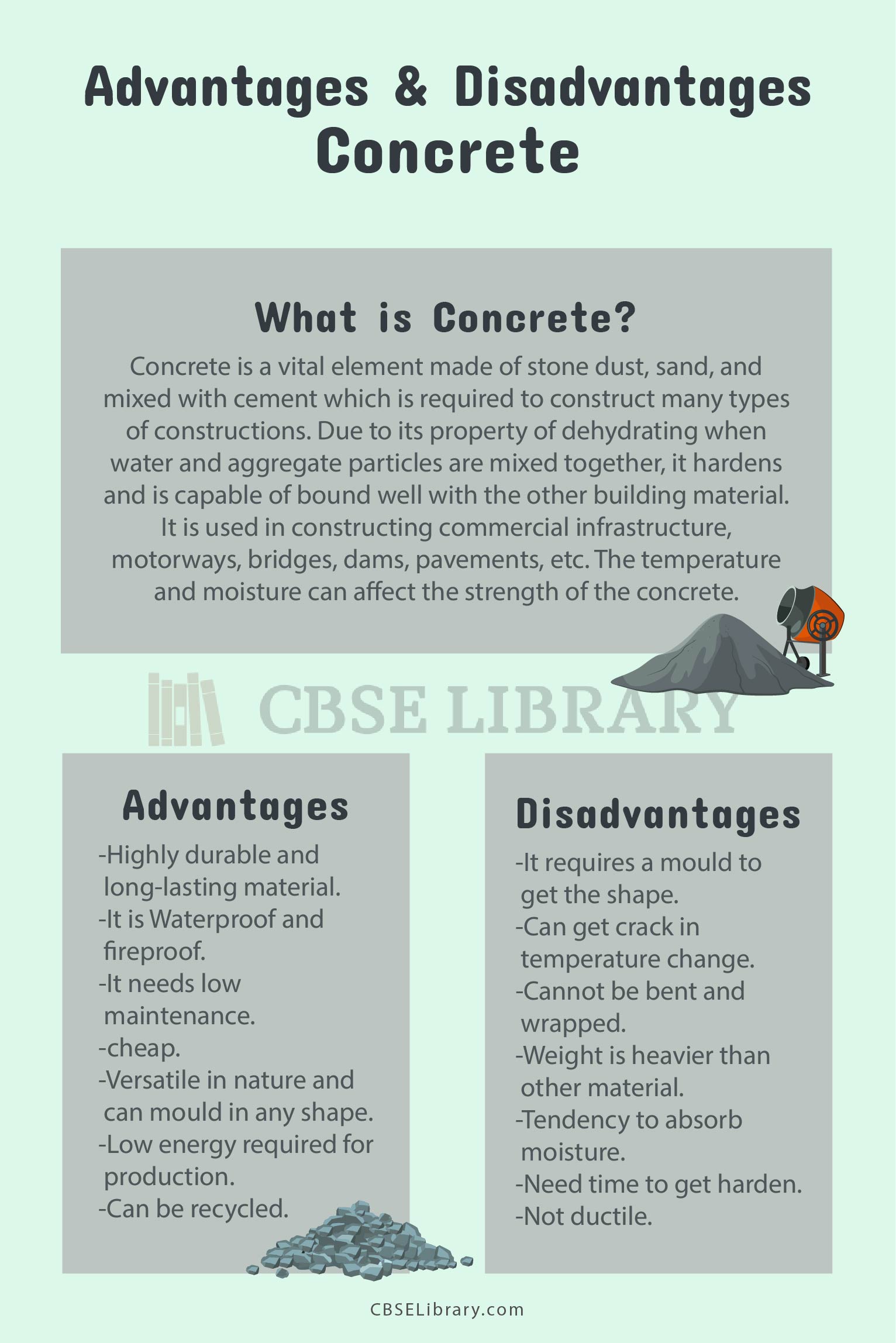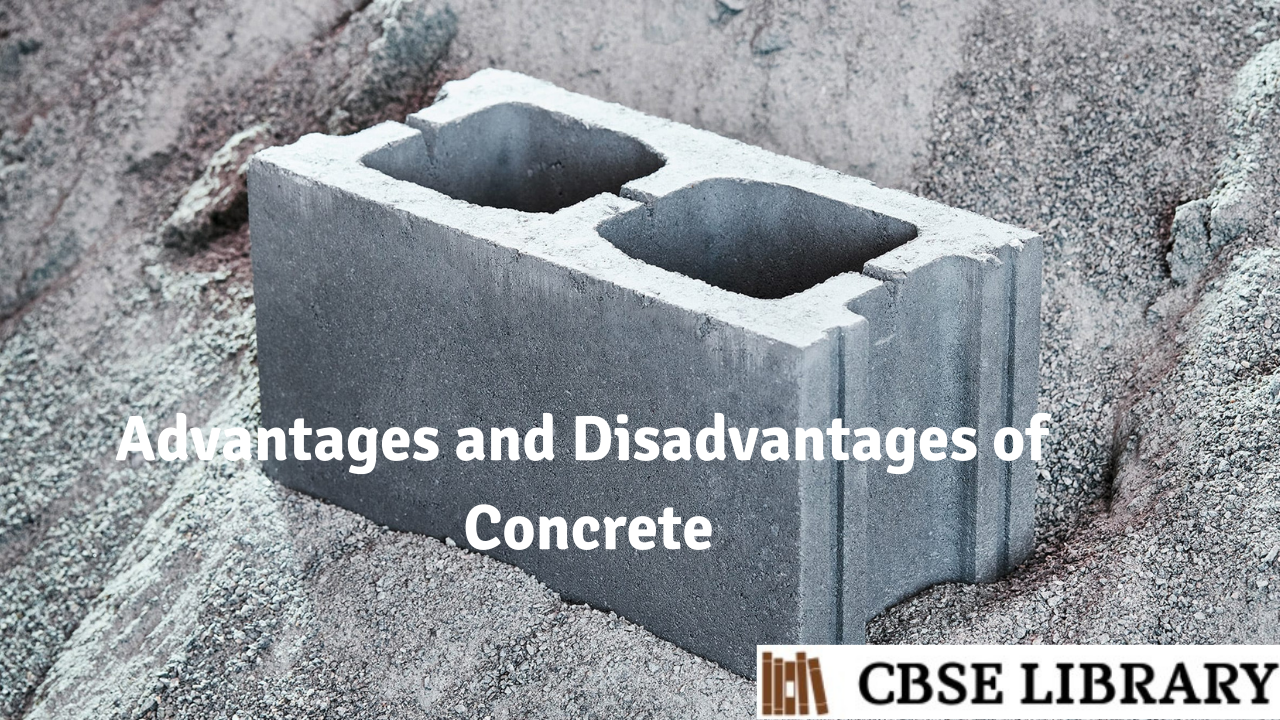Advantages and Disadvantages of Concrete: Concrete is a structural material that hardens due to the accumulation of aggregate particles mixed with water and sand, cement, and other similar materials. It is an essential vital element that is required for the construction of buildings, houses, or any infrastructure. The main reason for the use of concrete is bound well with the other building material as it hardens with mixing with water due to hydration. It helps in making various types of construction like foundations, roads, motorways, bridges, pavements, etc.
Students can also find more Advantages and Disadvantages articles on events, persons, sports, technology, and many more.
What is Concrete? What are its Characteristics?
Concrete is a vital element made of stone dust, sand, and mixed with cement which is required to construct many types of constructions. Due to its property of dehydrating when water and aggregate particles are mixed together, it hardens and is capable of bound well with the other building material. It is used in constructing commercial infrastructure, motorways, bridges, dams, pavements, etc. The temperature and moisture can affect the strength of the concrete. And also, if low temperature affects the strength, then it can be corrected by adding calcium chloride to the cement.it helps in generating heat and maintaining the low temperature that affects the concrete strength. Thus the strength of concrete is very important as it is used for mega construction and there will be a high-risk factor due to strength issues.
- Advantages of Concrete
- Disadvantages of Concrete
- Comparison Table Between Pros and Cons of Concrete
- FAQS on Advantages and Disadvantages of Concrete
Characteristics of Concrete
Here are some characteristics of Concrete that explain its various benefits and uses
- Concrete is gradually turned to be porous
- It is cheaper
- Concrete is electrical and abrasion-resistant
- It is free from corrosion
- It has no negligible effect due to thermal temperature
- Concrete takes time to set, but after some time it hardens and has strength
- It bound well with the other building material like steel
- It requires proper steps to be followed to get the correct mixture of concrete and the temperature should be according to the requirement which gives the right texture of concrete
These were some of the characteristics of concrete. Thus it is useful in constructing various types of construction like foundations, roads, motorways, bridges, pavements, etc.
Advantages of Concrete
Concrete is the most used element for construction as it is useful in many circumstances when other element does not work in any situation. Concrete is trustworthy in many different aspects. Let us see some of the advantages of concrete
- Long-lasting Material: Concrete is the most durable material as it can be strong and stand for years. It can survive all the weather conditions and other factors like earthquakes if mixed correctly with other building materials. All the constructions done using concrete gets stronger with the years. Thus concrete is more trustworthy and hence used widely in mega constructions.
- Waterproof and Fireproof: It can be waterproof and also fireproof as it becomes very strong and becomes water-resistant and heat resistant.
- Low maintenance: The best part about concrete is it dies not to require any maintenance once it is fully ready. Concrete does not need any painting or coating to maintain.
- Affordable: Concrete is used worldwide not only because it is good but also because it costs very less than other building materials like steel and wood. It is much cheaper and long-lasting, so it is very easily made at a low cost.
- Versatile In Nature: Concrete can be moulded into any shape and size if it is wet and soft, but if it hardens, then it cannot be moulded. Whereas other materials are not versatile in nature. Due to this, it can be used in many kinds of construction where it can be easily moulded to any shape.
- Less Energy Consumption: While making concrete,, it needs very less energy, which helps save more energy. Thus it can be a better option to consume less energy.
Disadvantages of Concrete
Here are a few disadvantages that show how concrete can have drawbacks.
- Concrete requires moulds or foam: To gain the required shape, it needs moulds as it is wet and can be moulded in any shape but not without any mould because it is loose in nature when it is wet.
- It can crack on temperature change: When the temperature changes rapidly, it can affect the concrete. Due to this, it can crack but does not affect its durability.
- Cannot be wrapped: Concrete is moulded when they are wet, but this cannot help to bend it or wrap it in any shape as we can do in steel.
- Absorbs Moisture: Concrete has the capability to absorb moisture which leads to making concrete damp and this makes way sometimes for fungus and algae to precipitate.
- Takes time to get repaired: Usually, concrete takes more than 24 hours to harden, making concrete more time than other materials to get repaired if needed. So for emergency cases, concrete can not be used.
These were the few advantages and disadvantages of concrete.

Comparison Table Between Pros and Cons of Concrete
| Pros | Cons |
| Highly durable and long-lasting material | It requires a mould to get the shape |
| It is Waterproof and fireproof | Can get crack in temperature change |
| It needs low maintenance | Cannot be bent and wrapped |
| cheap | Weight is heavier than other material |
| Versatile in nature and can mould in any shape | Tendency to absorb moisture |
| Low energy required for production | Need time to get harden |
| Can be recycled | Not ductile |
FAQS on Advantages and Disadvantages of Concrete
Question 1.
What is Concrete? What are its properties?
Answer:
Concrete is a vital element made of stone dust, sand, and mixed with cement which is required to construct many types of constructions. Due to its property of dehydrating when water and aggregate particles are mixed together, it hardens and is capable of bound well with the other building material. It is used in constructing commercial infrastructure, motorways, bridges, dams, pavements, etc. Thus the strength of concrete is very important as it is used for mega construction and there will be a high-risk factor due to strength issues.
Here are some properties of concrete:
- Concrete is gradually turned to be porous
- It is cheaper
- Concrete is electrical and abrasion-resistant
- It is free from corrosion
- It has no negligible effect due to thermal temperature
- Concrete takes time to set but after some time, it hardens and has strength
- It bound well with the other building material like steel
- It requires proper steps to be followed to get the correct mixture of concrete and the temperature should be according to the requirement which gives the right texture of concrete
Question 2.
What are the drawbacks of concrete?
Answer:
Concrete has many advantages, but it has a few drawbacks that are given below
- It has a tendency to absorb moisture
- Concrete can get cracks when the temperature changes
- It is not ductile
- It is heavy and bulky
- It needs time to get harden
- Not an eco-friendly material
- To gain the required shape it needs moulds
